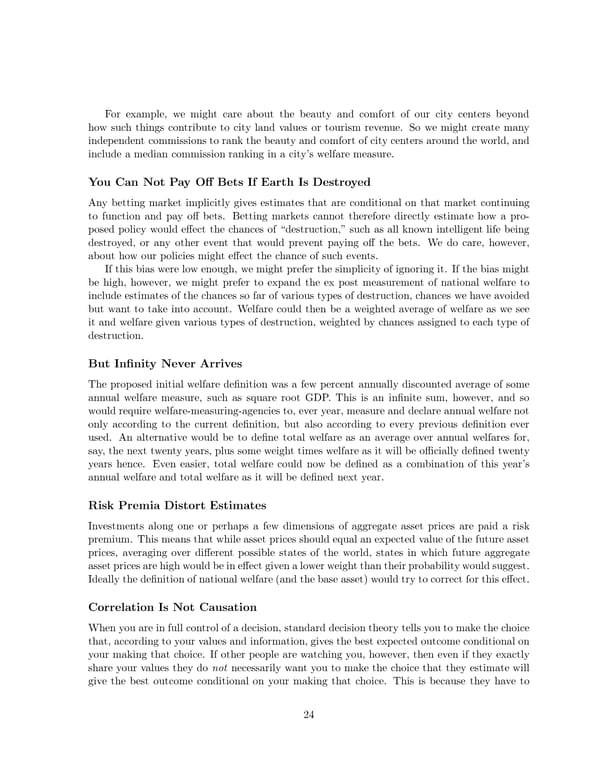For example, we might care about the beauty and comfort of our city centers beyond how such things contribute to city land values or tourism revenue. So we might create many independent commissions to rank the beauty and comfort of city centers around the world, and include a median commission ranking in a city’s welfare measure. You Can Not Pay Off Bets If Earth Is Destroyed Any betting market implicitly gives estimates that are conditional on that market continuing to function and pay off bets. Betting markets cannot therefore directly estimate how a pro- posed policy would effect the chances of “destruction,” such as all known intelligent life being destroyed, or any other event that would prevent paying off the bets. We do care, however, about how our policies might effect the chance of such events. If this bias were low enough, we might prefer the simplicity of ignoring it. If the bias might be high, however, we might prefer to expand the ex post measurement of national welfare to include estimates of the chances so far of various types of destruction, chances we have avoided but want to take into account. Welfare could then be a weighted average of welfare as we see it and welfare given various types of destruction, weighted by chances assigned to each type of destruction. But Infinity Never Arrives The proposed initial welfare definition was a few percent annually discounted average of some annual welfare measure, such as square root GDP. This is an infinite sum, however, and so wouldrequire welfare-measuring-agencies to, ever year, measure and declare annual welfare not only according to the current definition, but also according to every previous definition ever used. An alternative would be to define total welfare as an average over annual welfares for, say, the next twenty years, plus some weight times welfare as it will be officially defined twenty years hence. Even easier, total welfare could now be defined as a combination of this year’s annual welfare and total welfare as it will be defined next year. Risk Premia Distort Estimates Investments along one or perhaps a few dimensions of aggregate asset prices are paid a risk premium. This means that while asset prices should equal an expected value of the future asset prices, averaging over different possible states of the world, states in which future aggregate asset prices are high would be in effect given a lower weight than their probabilitywould suggest. Ideally the definition of national welfare (and the base asset) would try to correct for this effect. Correlation Is Not Causation Whenyouareinfull controlof a decision, standard decision theory tells you to make the choice that, according to your values and information, gives the best expected outcome conditional on your making that choice. If other people are watching you, however, then even if they exactly share your values they do not necessarily want you to make the choice that they estimate will give the best outcome conditional on your making that choice. This is because they have to 24
 Shall We Vote on Values, But Bet on Beliefs? Page 25 Page 27
Shall We Vote on Values, But Bet on Beliefs? Page 25 Page 27